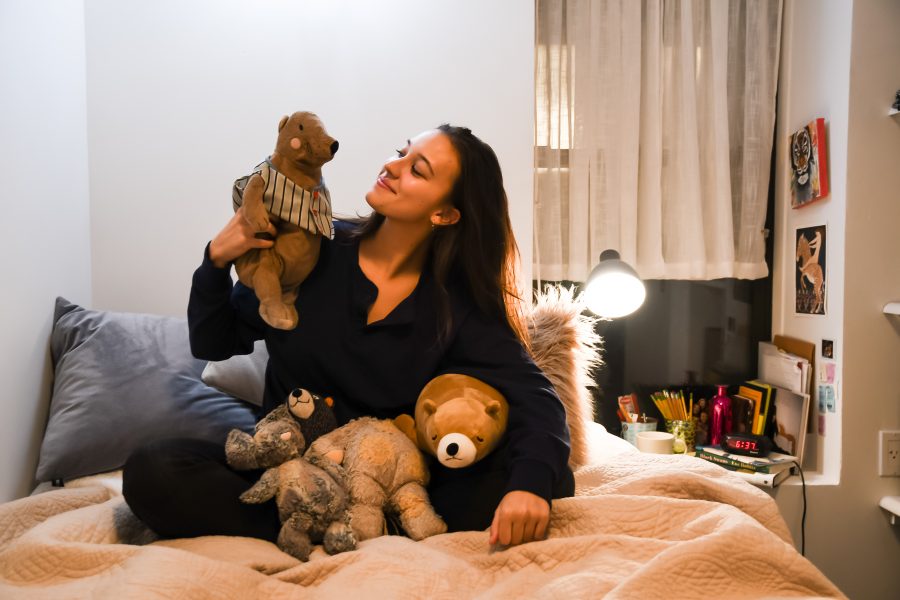When we were kids, our social lives consisted of 15 minutes of recess and parent-approved playdates. It makes sense then, why we became so attached to objects. Whether it was stuffed animals that were always there to hug or a blanket that was a consistent sleeping partner, our things were our friends. Maybe you formed a special connection to your pacifiers, and the only way your parents could make you get rid of them was by lying to you about how Disneyland was accepting pacifiers in exchange for a toy from the store? Maybe I need to work through that childhood trauma alone.
After playing such important roles in our lives, why are we so quick to dismiss our beloved stuffed animals? Is it because society tells us we’re too old for furry companionship?
According to Molly Thomas, a Tisch sophomore, we don’t have to succumb to societal pressure. From a dorm room in Weinstein Residence Hall to her current apartment bedroom, her stuffed animals were there through it all.
“It was honestly never really a question of if I would bring them or not,” she said. “It was more a question of how many and which ones, because I do have more at home.”
Others stuffed animal parents felt the same way. CAS sophomore, Isabella Bohren, talked about her thought process in packing up her furry friends for New York.
“I wasn’t really embarrassed because I just knew they had to come with me,” Bohren states. “I wanted to bring more but I remembered thinking if I brought too many, people might question my sanity, so I limited it.”
Though Bohren somewhat considered what others might think of her stuffed animal collection, both her and Thomas cast fear of others’ opinions aside so that their plush companionship could remain a staple on their beds at all times. However, the decision process was a bit more difficult for Thomas, as she’s always been concerned about making each animal feel loved.
“I’ve always been someone who really pays attention to which ones are just on my bed and which ones are actually in my arms,” Thomas shared. “When I was younger, I really took time to make sure each one felt special, and I had a rotation deciding which ones got to be in my arms, closest on the pillow and farthest away from me on the pillow.”
So sweet. Thomas seems like the perfect stuffed animal mom, but as with any other parent-child relationship, there have been problems. Thomas faced a crisis as her first-year roommate pointed out that her favorite stuffed animal was not what Thomas thought he was.
“I have a stuffed bear that I thought was a mole for most of my life, so his name is Mr. Mole,” Thomas admits. “Turns out he is, indeed, a bear.”
Every relationship has its issues, but it seems as though Thomas and Mr. Mole were able to work through their miscommunication.
“Actually, Mr. Mole is the one with the most personality. He’s the one that’s always popping up. I’m not kidding.” Thomas insists, “I’ll wake up and he’ll be sitting in a funny position or he’ll have one of his shirt buttons unbuttoned. Or in Snapchats, I’ll look behind me and he’s trying to get in, kind of cheesing in the background.”
Bohren remembers Thomas’s mole versus bear dilemma and comments on the difference in personalities between her stuffed animals and those of Thomas.
“I was roommates with Molly last year,” Bohren said. “She definitely had the more social stuffed animals, whereas mine kind of kept to themselves.”
Despite a difference in character, a common thread seems to be that stuffed animals provide their owners with comfort, especially when entering into the college and all of the unknowns this phase of life presents. LS first-year Zoe Jimenez recently went through this transition.
“My stuffed animals bring a sense of comfort, especially when I’m missing home,” Jimenez said. “Each of them reminds me of one of my dearest family members.”
These three students had the bravery to disregard what others might think of their stuffed animals, choosing unconditional comfort over potential criticism. For those who were overcome with embarrassment at the thought of bringing their own furry friends, Thomas has some choice words.
“‘Have you no decency?’” Thomas asked. “Because how would you feel if you were left on a bed all sad and alone?”
Forget what society says. A friend is a friend, no matter if it’s blood or stuffing filling up their insides.
Email Calais Watkins at [email protected].

























































































































































